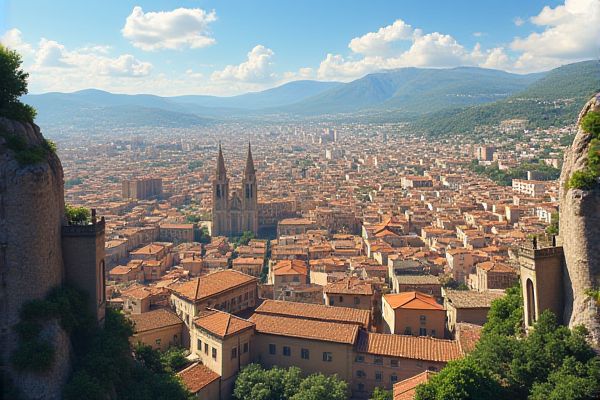
Social and community groups in Spain: Diverse cultural associations. Numerous language exchange meetups. Active expat communities. Local community festivals. Volunteer opportunities available. Strong focus on family values. Popular regional traditions. Sports clubs widely accessible. Religious and spiritual groups. Artistic and music collectives.
Diverse cultural associations.
In Spain, diverse cultural associations include organizations like the Centro Cultural Espanol de Cooperacion Iberoamericana, the Gabarron Foundation, and the U.S. Cervantes Institutes, which promote cultural cooperation, art exhibitions, and the teaching of Spanish language and culture, both within Spain and internationally. These groups foster dialogue, exchange, and the promotion of Spanish culture through various cultural activities, exhibitions, and educational programs. More information about these vibrant cultural organizations can be explored through their listing on the Spain Culture website.
Numerous language exchange meetups.
In vibrant cities like Madrid and Barcelona, language enthusiasts and social butterflies have a plethora of opportunities to immerse themselves in language exchange events. People in Madrid can join various meetups, such as the lively sessions at Beer Station, where individuals gather weekly on Thursdays and Sundays to practice Spanish, English, and other languages while enjoying reduced prices on drinks and food. Meanwhile, in Barcelona, The Friday Language Exchange organizes invigorating meetups across different locations on Wednesdays, Thursdays, Fridays, and Saturdays, providing a dynamic environment to practice languages and forge friendships. For those in Madrid seeking diverse linguistic encounters, Eventbrite offers an array of events like "Tipsy Tuesday," "Sip N Speak," and "Saturday Language Exchange," allowing participants to engage in free or affordable social and language practice events across the city.
Active expat communities.
Active expat communities in Spain encompass regional groups, professional networks, and cultural or language exchange groups, offering a wealth of resources through platforms such as Expatica, Internations, and various social media channels. These communities, as highlighted by Edwards European Moving, organize a variety of events including regular meetups, cultural festivals, and networking activities. This enables expats to integrate more seamlessly into Spanish society, fostering the development of meaningful connections and enriching their overall experience in the country.
Local community festivals.
Spain is renowned for its vibrant local community festivals, such as Las Fallas in Valencia, La Tomatina in Bunol, Semana Santa across various regions, the Sitges Carnival, and the Feria de Abril in Seville, each showcasing unique cultural traditions, community participation, and festive celebrations that reflect the country's rich heritage and regional diversity. These festivals often include parades, traditional dances, food, and fireworks, highlighting the strong sense of community and cultural identity in Spain. For more details on these spectacular events, visit the Festivals in Spain page to explore the essence of these cultural celebrations.
Volunteer opportunities available.
Volunteering in Spain presents an array of enriching opportunities catering to diverse interests and social impacts. From engaging in environmental and marine conservation to supporting educational initiatives, Spain offers projects that span across various fields and locations including the vibrant city of Barcelona. Volunteers can participate in meaningful work such as helping at youth and women's shelters, assisting in childcare and community development, or contributing to archeological restoration and medical field endeavors. These initiatives are closely aligned with the UN Sustainable Development Goals, ensuring that each program not only provides assistance but also fosters sustainable progress. Additionally, projects focusing on marine life, horses, wildlife conservation, and arts for individuals with disabilities highlight the broad scope of volunteering options available for those eager to make a positive difference.
Strong focus on family values.
In Spanish culture, family and community are deeply valued, with a strong emphasis on "familismo" and "vecindad" (neighborhood solidarity), highlighting the importance of loyalty, support, and solidarity within both family and community contexts. Family gatherings, respect for elders, and communal harmony are central to Spanish social and community life. For a deeper exploration of these values, the richness of Spanish culture can be further understood by visiting the StudiesIn Knowledge Base, offering insights into the traditions that bind Spanish communities together.
Popular regional traditions.
In Spain, popular regional traditions include the siesta, late dinners, and various musical styles like Flamenco, Rumba Catalana, Sardana, and Habaneras, each reflecting the unique cultural identities of regions such as Andalusia, Catalonia, and Valencia. Festivals like San Fermin, Semana Santa, Feria de Abril, Las Fallas, and La Tomatina are also integral to Spanish social and community life, showcasing vibrant celebrations and local customs. For more detailed insights and exploration of these customs, you can visit the Spanish Culture Traditions website which delves deeper into these fascinating aspects of Spanish culture.
Sports clubs widely accessible.
In Spain, sports clubs like Atletico Madrid are championing inclusion by aiming to set a record for the highest number of spectators with disabilities attending a sports event, collaborating with organizations like AccessibAll and Integrated Dreams to enhance accessibility and promote inclusivity in European sports venues. This initiative includes measures such as reserved parking and dedicated staff to assist disabled fans, reflecting a broader commitment to making sports more accessible for all.
Religious and spiritual groups.
In Spain, the dominant religious group is the Catholic Church, with 52.0% of the population identifying as Catholics, although many are non-practising. Other significant religious and spiritual groups include Muslims, Protestants, Orthodox Christians, Buddhists, Hindus, and various pagan and Wiccan communities, with freedom of religion guaranteed by the Spanish Constitution and regulated through specific laws and cooperation agreements. For more information, you can explore the detailed overview of these diverse religious practices on Religion in Spain.
Artistic and music collectives.
In Spain, artistic and music collectives like Sonora, a Classical Music Collective founded by Sofia Sainz and Bartomeu Tur, aim to revolutionize the classical music scene by providing young musicians with professional opportunities and intimate, innovative performances. Additionally, the Spanish independent music scene is vibrant with collectives and artists such as Las Migas, Bea Pelea, and Free Sis Mafia, who blend traditional Spanish genres with modern styles like flamenco, trap, and hyperpop. Explore how Sonora is breaking down prejudices against classical music, one candle-lit intimate show at a time.
